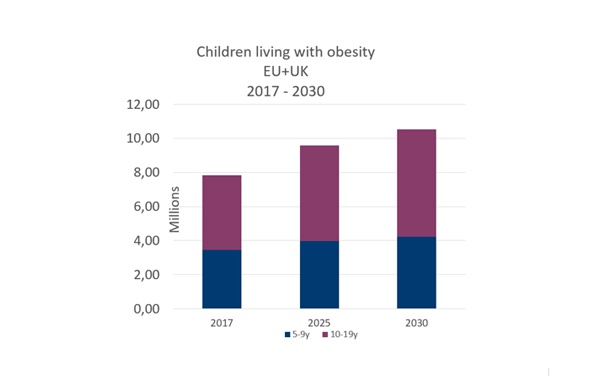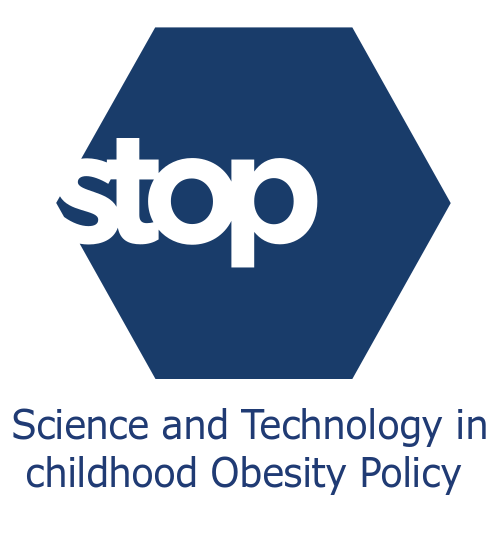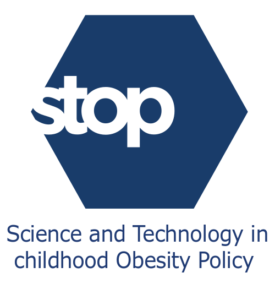On October 13th, 2020, the STOP project organised a workshop at the World Congress on Public Health where we showcased the impact of different policy options evaluated through the project and attempted to increase participants’ understanding of multi-stakeholder engagement.
Childhood obesity has grown to become one of the most dramatic features of the global obesity epidemic, with long-term consequences on health, social and economic outcomes. The spread of obesity has been fuelled by changes in social norms and living environments that have shaped individual behaviours making them increasingly conducive to excessive and imbalanced nutrition, sedentary lifestyles, and ultimately obesity and the diseases associated with it. Despite the World Health Assembly establishing a global target of no increase in the prevalence of obesity by 2025 [from 2010 levels], very few countries are showing a better than a 50% chance of meeting the target. Specifically, in Europe, current trends are showing a dramatic increase, and it is predicted that by 2030, 10m children in the EU region will be affected by obesity.

In-light of current trends, novel interventions are urgent now more than ever. Over a four-year period, the STOP project will aim to generate scientifically sound, novel and policy-relevant evidence on the factors that have contributed to the spread of childhood obesity in European countries and on the effects of alternative technological and organisational solutions and policy options available to address the problem.
Our workshop at the World Congress on Public Health presented some of the latest evidence collected as part of the project to bring new, innovative approaches to current childhood and adolescent obesity-related interventions. The workshop was also an opportunity to showcase findings on the attitudes of different stakeholders towards obesity policies and debate the benefits, risks, and challenges of multi-stakeholder engagement. Specifically, we aimed to:
- Showcase the impact of different policy options evaluated throughout the STOP project
- Increase participants’ understanding and awareness of the opportunities and challenges associated with the implementation of selected policies
- Increase awareness of public health professionals on the importance of overcoming siloes in identifying and implementing public health policies
- Increase the understanding of multi-stakeholder engagement
As highlighted by Professor Franco Sassi, PI of the STOP project, the Consortium is covering the whole umbrella of different disciplines, to be able to understand and produce useful policy recommendations for childhood obesity. In addition to providing basic clinic research insights, and comprehensive epidemiological data, the project seeks to look at childhood obesity [and its drivers] holistically and provides an overview of different public health-oriented measurements, understanding of stakeholders networking and effective communication.
The multi-stakeholder engagement process in the STOP project
STOP recognises there are many drivers of obesity and therefore one-size-fits-all policy approaches to childhood obesity are bound to fail. For this reason, the stakeholder engagement process is an integral component of the project. To ensure the development of sustainable and effective policies, Dr Mojca Gabrijelčič, outlined the initial results from the project’s stakeholder engagement process. Through organised stakeholders’ dialogues and survey, her work package aims to explore and discuss the perception of potentials of policies and measures related to childhood obesity and, with the input of different sectors and stakeholders, contribute to identifying possible policy governance and engagement solutions for stakeholders networking, which will reflect on the work of the project. The dialogues draws on the evidence generated across the different policy work packages, and will ultimately generate indicators and an accountability framework for childhood obesity.

Acceptability and effectiveness of regulatory and fiscal policies
Margot Neveux then presented the findings from a recent study conducted by World Obesity on looking at the impact of regulation and fiscal policies on children’s overall diet. The food environments in which people develop their dietary behaviour and make their food choices have significant influence on what they purchase and, in turn, what they eat. Food prices, food labelling and food marketing are one of the determinants of food choices. They influence, to a certain degree, what and how much food people buy, and policies based on these determinants have been effective in promoting desirable dietary changes. However, these assessments of dietary changes have been exclusively conducted at the adult level, and not at children level. In order to address this gap, we conducted a contextual review looking at (i) fiscal policies (food and non-alcoholic beverages), (ii) the regulation of food labelling and (iii) the regulation of the marketing of food products to children. The review overwhelmingly found all three policy interventions to likely be low-cost and highly cost-effective, with restrictions on marketing having the greatest long-term impact. While stakeholders with commercial interests are likely to show resistance to the implementation of regulatory policies, the general public, healthcare professionals and NGOs tended to be supportive of all analysed policies. According to the review, the evidence for all three policy interventions supports their adoption and promotion by international, national and local authorities, as part of a portfolio of measures to tackle obesogenic environments.
School-based physical activity policies in the prevention of childhood obesity
Finally, Dr Maroje Sorić discussed the effectiveness of available school-based policies aimed at increasing energy expenditure in the prevention of obesity. Specifically, a special focus was brought to the type and content of implemented interventions as well as to the moderation of the effects by gender, with a specific focus on socially vulnerable groups of children. The work done through the STOP project identified school-based physical activity interventions as effective in preventing obesity. Furthermore, building on existing evidence as well as STOP’s recent work, it recognised the following three criteria to maximise the success of such policies:
- Our work revealed that physical activity programmes should be designed to enhance physical fitness. However, it might be modified by gender, a factor that should therefore be considered.
- Physical activity should be enjoyable.
- It is wise to include physical activity in the school curriculum.
In-light of the current pandemic, this will likely be one of the public health priorities in the future. The pandemic and the measures to help curb COVID-19 are likely to have a significant impact not only on people living with obesity but also on the health of the general population. Lockdowns around the world have led to sustained shifts in diets and levels of physical activity, all of which may increase risk of risk of obesity and other NCDs. Future interventions will need to take the current context into account.
COVID-19 – turning a crisis into an opportunity for action on childhood obesity?
The COVID-19 pandemic is giving us an opportunity to Build Back Better and ensure we develop healthier systems and environments. This will include the implementation of win-win-win policies to reduce COVID-19 risks by promoting healthy food environments, access to sustainable and affordable diets, and increased physical activity opportunities. Engaging with the different stakeholder groups will be essential to help transform this crisis into an opportunity to increase our actions to tackle childhood obesity.
The recording of our workshop will be available to all those registered to the Congress until the end of October 2020 via the WCPH virtual platform.

